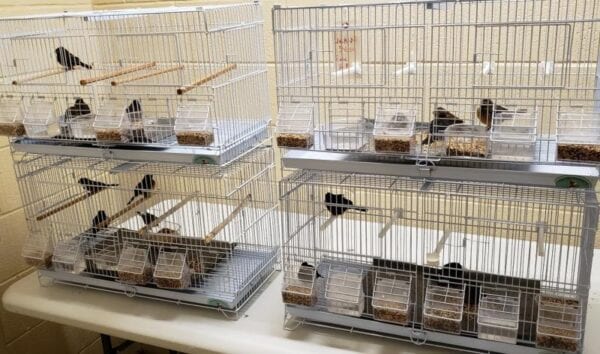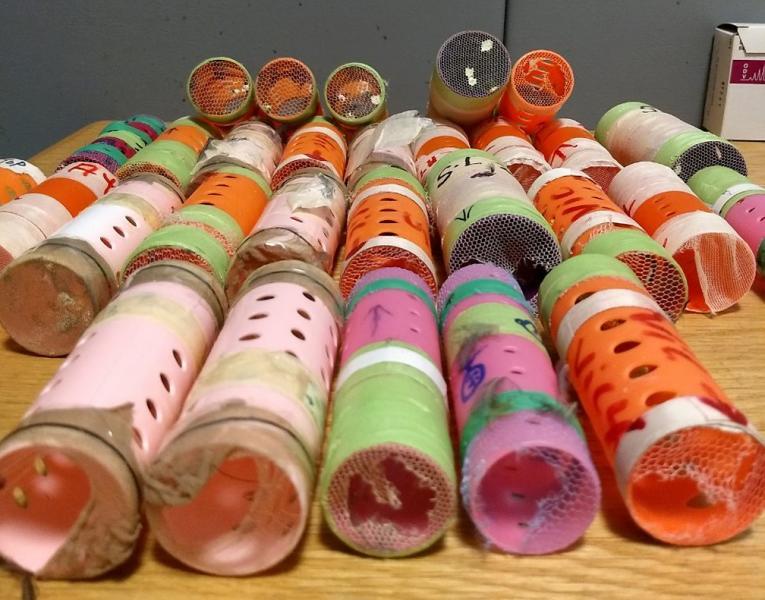JAMAICA, N.Y. – This wasn’t the usual game of peek-a-boo, but U.S. Customs and Border Protection officers won anyway after they discovered 29 finches concealed in hair rollers inside a Guyana man’s baggage at John F. Kennedy International Airport on Sunday.
CBP officers discovered the finches during a secondary baggage examination after the 26-year-old man arrived on a flight from Georgetown, Guyana. CBP agriculture specialists consulted with U.S. Fish and Wildlife Service inspectors who directed CBP to seize the finches.
The man, who was destined to an address in New Jersey, was not criminally charged; however, CBP assessed a $300 civil penalty, allowed the man to withdrawal his request for admission, and placed him on a Guyana-bound flight on Monday.

CBP agriculture specialists quarantined the finches and turned them over to United States Department of Agriculture Veterinary Services.
“Customs and Border Protection officers and agriculture specialists face a very complex and challenging task and that is to protect our nation, our citizens, our agricultural resources and our economic security, and they meet that challenge with extraordinary commitment and vigilance,” said Marty C. Raybon, Acting Director of Field Operations for CBP’s New York Field Office.
Crisis at the Border…more news
- Two more illegal alien sex offenders stopped near border
- Three immigrant sex offenders captured at the border in a three-hour span
- 367 Pounds of Meth Heading for U.S. neighborhoods stopped at Mexican border
- 60 Illegals caught, human trafficking tractor-trailer jackknifed on US-59
“The smuggling of these birds in hair curlers shows the horror of wildlife trafficking,” said Ryan Noel, Special Agent in Charge for the U.S. Fish and Wildlife Service Office of Law Enforcement. “I would like to thank U.S. Customs and Border Protection and the U.S. Department of Agriculture for their assistance with this case. By working together, we can help protect humans, and wildlife, for future generations.”
The public is encouraged to Report Wildlife Crime tips to U.S. Fish and Wildlife Service to FWS_TIPS@fws.gov or at 1-844-FWS-TIPS (397-8477).
The U.S. Department of Agriculture Animal and Plant Health Inspection Service describes the lawful process for importing birds for commercial purposes. Improperly imported birds pose the potential threat of introducing Highly Pathogenic Avian Influenza (HPAI), also known as bird flu, to the United States poultry industry.
The U.S. poultry industry suffered severe impacts during a 2015 HPAI outbreak. According to the USDA Economic Research Service, more than 50 million commercial turkeys and laying hens in the U.S. died or were culled to stop the spread of the disease. The losses were estimated at more than $1 billion, and the economic impact much greater as more than 50 poultry trading partners imposed partial to full bans on U.S. poultry imports. The U.S. poultry industry has since recovered.
CBP agriculture specialists have extensive training and experience in the biological sciences and agricultural inspection. They examine international trade shipments and traveler baggage every day in the search for invasive insects, federal noxious weeds, and plant and animal diseases that could have a serious impact on our national agricultural resources.
News from Biden’s Border Crisis
- Romanians caught entering U.S. illegally through Canadian Border
- Border Patrol Agents Arrest 18, Shut Down Human Trafficking Stash House in Imperial
- Border Patrol arrests six illegals crossing near Yuma
- Mexican human traffickers drop toddler from top of border wall, abandon her in desert
